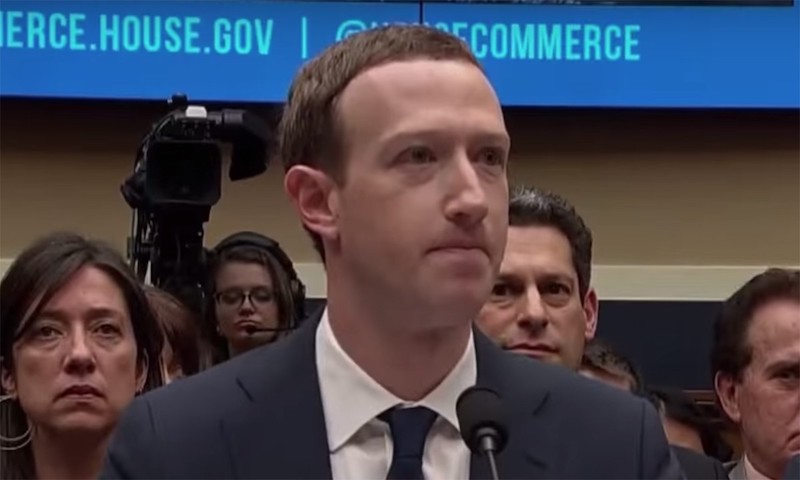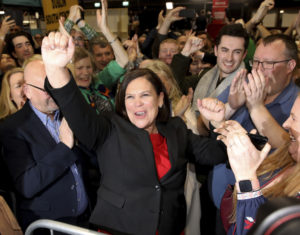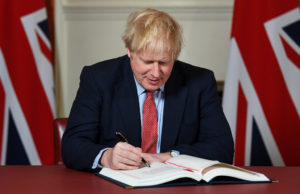‘The Great Hack’ Shows How Facebook Got Your Number
For an Oscar-nominated filmmaking team, what started as a documentary on the Sony hack morphed into Cambridge Analytica’s brain hack. Facebook CEO Mark Zuckerberg in "The Great Hack" trailer. (Netflix via Youtube)
Facebook CEO Mark Zuckerberg in "The Great Hack" trailer. (Netflix via Youtube)
When filmmaker Jehane Noujaim and producer Karim Amer made “The Square,” their Oscar-nominated documentary about the 2012 Arab Spring uprising in Cairo’s Tahrir Square, part of their focus was on the power of social media in organizing a virtual public square that unified protesters and enabled free speech. Six years later, their new film, “The Great Hack,” finds the social media public square becoming a public sewer, where vitriol and lies are coin of the realm. Exhibit No. 1 is the sordid saga of Cambridge Analytica, the controversial consulting firm that used unauthorized personal data gleaned from Facebook.
“Cambridge Analytica was practicing voter suppression, different kinds of methods of manipulating the population of these different countries in the Third World and then bringing it back to the U.S. and the U.K. in order to influence those populations,” Amer, the film’s co-director, told Truthdig.
“Facebook should be seen as being part of the largest corporate negligence case in American history,” he said. “The leak of Facebook data of 100 million-plus users—we don’t see it, so we don’t feel it, but what’s happening in the psy-ops world is a new era of colonization. He or she that collects the most up-to-date data on the most people on the planet and shows the ability to influence their behavior, wins.”
It began with The Guardian reporter Carole Cadwalladr, who was investigating Cambridge Analytica’s work on behalf of the Brexit campaign. Former employee Christopher Wylie turned out to be the whistleblower she needed to uncover where company CEO Alexander Nix was getting his vaunted 5,000 data points on every U.S. voter. It was a claim Nix made while working for the 2016 Trump campaign and Texas Sen. Ted Cruz’s campaign before that.
Wylie appears in an interview, but he was reluctant to commit to the filmmakers. Instead, he recommended that they contact Cambridge Analytica’s former director of business, Brittany Kaiser, who worked on the campaign of former presidential candidate Howard Dean and later for Barack Obama until she was hired by the data firm. At that point, Cambridge Analytica’s board included Trump strategist Steve Bannon and was funded by the Mercer family. While partying in Ibiza on her 30th birthday, Kaiser learned she was being summoned by the Mueller investigation team, having gone from being a witness to becoming a person of interest. It was later revealed that she had met with WikiLeaks founder Julian Assange.
Cambridge Analytica began as an app, developed by Cambridge University professor Aleksandr Kogan, that distributed a personality questionnaire to users from which researchers gleaned data to build predictive personality profiles. Field-tested on hundreds of thousands of Facebook users, Cambridge Analytica mined personal information not only from those who had filled out the questionnaire, but from all of their friends, who hadn’t. As a result, the company was able to reap data from millions of users.
The company then weaponized the information, first identifying “persuadables” based on the questionnaire, then targeting them with aggressive messaging to get them to vote in a predetermined way. In tight races in the 2016 presidential election, such as those in Michigan, Wisconsin and Pennsylvania, this tactic may have helped tip the balance.
“It’s about transparency,” Noujaim said. “Do people who are taking these quizzes know their personalities are being tested and collected in order for a company to figure out if you are highly neurotic and highly open, and whether you live in a particular state and therefore whether you should be targeted with fear-based ads in order to make you fearful about issues that are exaggerated and cause you to vote in a certain way, or cause you not to vote at all—actual voter suppression tactics? It’s people understanding what the stakes are and what it means to have so many of your decisions, as moral human beings, being influenced by an amoral algorithm that basically wants you to buy more and stay online more.”
The inciting event in the movie, which opens in theaters and on Netflix starting Wednesday, is a lawsuit brought by David Carroll, a professor of media design at The New School in New York. Under British law, Carroll has the right to access whatever personal information Cambridge Analytica has on him. In the end, the company pleaded guilty—not for stealing data or for subversion of the political process, but for defying a government order to hand over Carroll’s data.
The reason the case wasn’t filed in the U.S. is because no U.S. laws were broken. Even so, Cambridge Analytica shut its doors in May 2018, while Alexander Nix continues to be a star within the industry. Even though tech companies are coming under investigation—including Alphabet Inc.’s Google—and some lawmakers and advocates have muttered threats about rolling back liability protections granted by Section 230 of the Communications Decency Act for platforms that post incendiary third-party messages, no legislation has been proposed yet. That means the 2020 election will likely be a social media free-for-all.
“Right now, data has been completely unregulated,” Amer said. “It’s not Cambridge Analytica’s fault that the American election is the biggest election business in the world. It’s not Cambridge Analytica’s fault that the democratic process has been commoditized, in that you can buy, trade and sell different nodes within it. It’s not Cambridge Analytica’s fault that we all agreed to give up all of our data and privacy in the name of connectivity, in exchange for an admission fee. These are not things that Cambridge Analytica created. Cambridge Analytica is just a company taking advantage of the situation and pursuing the American dream of becoming a billion-dollar company.”
Despite having handed over the personal data of millions of users without their consent, Facebook hasn’t broken any laws either. Nor is it outlawed for withholding information on those who post deliberately incendiary and racist messages. When asked to appear before Parliament regarding Cambridge Analytica’s role in the Brexit campaign, Facebook CEO Mark Zuckerberg refused.
“Facebook has shown that it feels it is above the law of nations,” Amer said. “We should be asking Facebook: Have they incentivized polarization because it keeps people connected and checking more?”
With legal and social acquiescence, personal data from the Department of Motor Vehicles might wind up in the hands of auto insurers, or medical data in the hands of health insurers. “It’s about the pendulum of technology, that we assumed only swung to the side of progress, swinging the other way. The same way that credit scores were so important for accounting in a society based on credit transactions and debt, we’re now entering a place where our data is going to be a barometer for us. And the question is, did we really consent to that?” Amer said. “It’s a constant battle for the hearts and minds, and those who have the leverage and persuasion are always going to be desired in the era of data wars. That’s the new battleground.”
Your support matters…Independent journalism is under threat and overshadowed by heavily funded mainstream media.
You can help level the playing field. Become a member.
Your tax-deductible contribution keeps us digging beneath the headlines to give you thought-provoking, investigative reporting and analysis that unearths what's really happening- without compromise.
Give today to support our courageous, independent journalists.









You need to be a supporter to comment.
There are currently no responses to this article.
Be the first to respond.